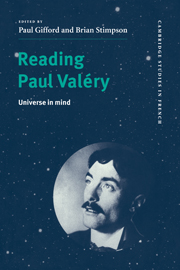Book contents
- Frontmatter
- Contents
- Contributors
- Abbreviations
- Introduction
- PART 1 SELF-SCIENCE
- 1 Towards a biography of the mind
- 2 Thinking-writing games of the Cahiers
- 3 Paradigms of the self: Valéry's mythical models
- 4 The fascination of science
- 5 An art of rethinking: Valéry's ‘negative philosophy’
- PART 2 SELF-WRITINGS
- PART 3 BODY, MIND, WORLD
- Conclusion
- Bibliography
- Index
- Cambridge Cultural Social Studies
2 - Thinking-writing games of the Cahiers
Published online by Cambridge University Press: 04 August 2010
- Frontmatter
- Contents
- Contributors
- Abbreviations
- Introduction
- PART 1 SELF-SCIENCE
- 1 Towards a biography of the mind
- 2 Thinking-writing games of the Cahiers
- 3 Paradigms of the self: Valéry's mythical models
- 4 The fascination of science
- 5 An art of rethinking: Valéry's ‘negative philosophy’
- PART 2 SELF-WRITINGS
- PART 3 BODY, MIND, WORLD
- Conclusion
- Bibliography
- Index
- Cambridge Cultural Social Studies
Summary
‘C'est à l'univers qu'il songe toujours, et à la rigueur’ (‘His constant thought is of everything and of rigour’) (Œ, i, p. 1155): Valéry's characterisation of Leonardo's notebooks exactly prefigures his own Cahiers. Any one of the twenty-nine volumes of the in-facsimile edition opened at random (and even more so, the 26,600 pages of the series as a whole), attests a radicalism and a range of intellectual curiosity for which nothing else in twentieth century writing quite prepares us.
The mind-shift required in adjusting to the universalist vocation can be disconcerting, particularly if we open the ‘difficult’ early Cahiers (pre-1900) which plot the heroic beginnings of Valéry's ‘System’. Algebraic equations attempting to model mental functioning jostle on the page with critical remarks on traditional psychology or philosophy or language science. The analysis of common mental operations invokes a strangely abstract imagery drawn from classical physics (force fields, crystals, degrees of symmetry, actions at a distance, reasoning by recurrence, ‘ether’). These operations in turn connect, by subterranean webs of association, to analyses of Napoleon's exercise of power; or else, to remarks on dreaming or mysticism or the sexual act or the experience of battle as depicted in Stephen Crane's novel of the American Civil War, The Red Badge of Courage. Or they call up, within the sphere of abstraction, fleeting fragments of prose poetry or intellectual autobiography.
- Type
- Chapter
- Information
- Reading Paul ValéryUniverse in Mind, pp. 36 - 52Publisher: Cambridge University PressPrint publication year: 1999

